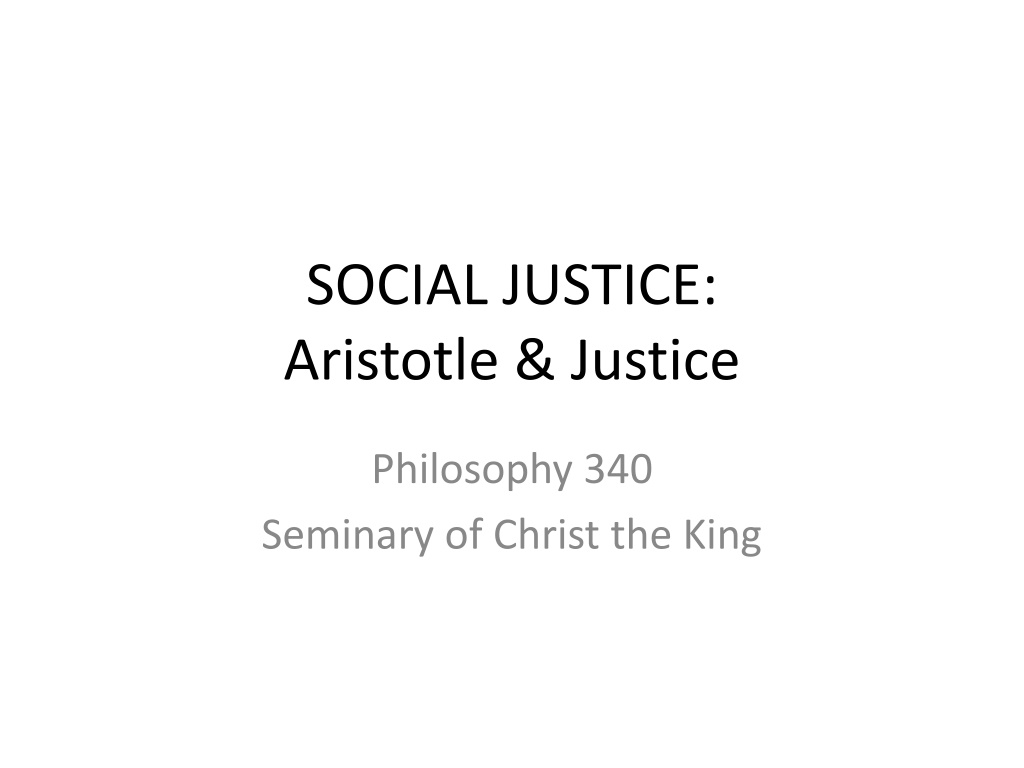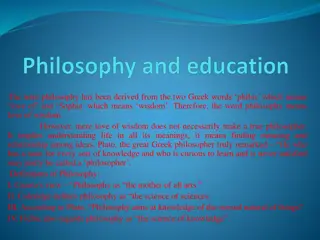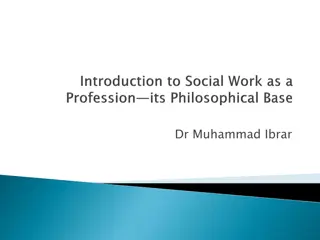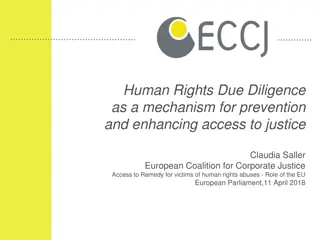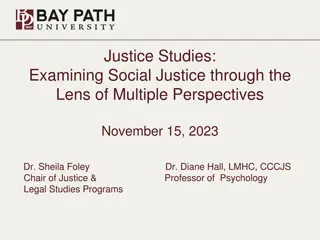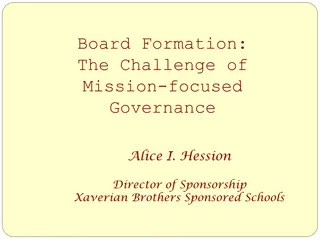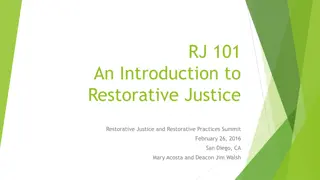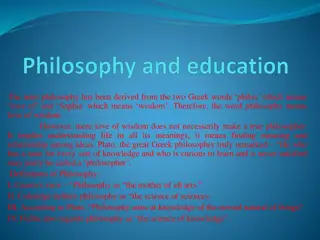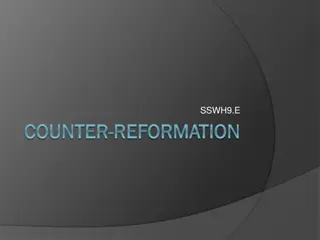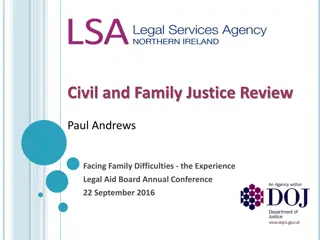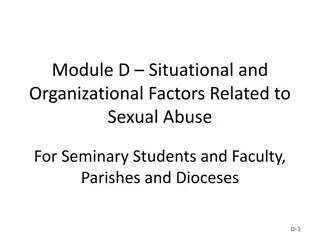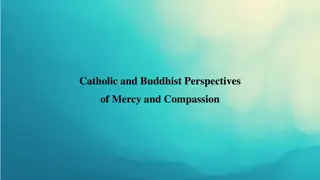Understanding Justice and Rights in Catholic Philosophy
Explore the concepts of justice, natural rights, and acquired rights in Catholic philosophy through the lens of Aristotle and Cardinal Virtues. Learn how duties, responsibilities, and the enabling of rights shape our moral behavior and societal interactions.
Download Presentation

Please find below an Image/Link to download the presentation.
The content on the website is provided AS IS for your information and personal use only. It may not be sold, licensed, or shared on other websites without obtaining consent from the author. Download presentation by click this link. If you encounter any issues during the download, it is possible that the publisher has removed the file from their server.
E N D
Presentation Transcript
SOCIAL JUSTICE: Aristotle & Justice Philosophy 340 Seminary of Christ the King
Catholic Encyclopdia: Justice Defined JUSTICE: the most important of the Cardinal Virtues. 1. Prudence perfects the intellect: inclines it to act in all things according to recta ratio. 2. Fortitude controls the irascible passions 3. Temperance moderates the appetites according to recta ratio. A moral quality, or habit, that perfects the Will JUSTICE has reference outward Like Charity, it regulates intercourse to fellow man.
Catholic Encyclopdia: Rights: Natural Rights Man has RIGHTS only because he primarily has DUTIES. Rights are secondary to duties. 1. Man has a duty, obligation, to strive to fulfil the designs of his Creator Must conduct his life according to the intentions of his Lord and Master. 2. Because of this duty man is invested with Rights, which leave him free, enable him, to execute his duties. 3. These are NATURAL RIGHTS: granted Nature herself, sacred, as is their origin, and inviolable. E.g. right to live, to integrity of limb, to freedom, to marry or not to marry, to acquire property, etc.
Catholic Encyclopdia: Rights: beside Natural Other Rights may be ACQUIRED, by free acts, e.g.: marriage right of husband & wife right to ownerless property by occupation right to abode by purchase or let. Other Rights may be POSITIVE: [OED] POSITIVE LAW: a law or body of laws artificially instituted or imposed by an authority . Divine Law (thus DIVINE RIGHTS): e.g. Ten Commandments Human Law (thus HUMAN RIGHTS) Civil Law (thus CIVIL RIGHTS): e.g. citizenship, franchise, lex rex, etc. Ecclesiastical Law (thus ECCLESIASTICAL RIGHTS): e.g. Regula Benedicti.
Catholic Encyclopdia: Rights & Justice RIGHT, as a substantive (my right, his right), designates the object of JUSTICE. Justice is the enabling, provision, defense of Rights in order that duties may be performed. OED: Justice: I. Administration of law or equity. 1. Maintenance of what is just or right by the exercise of authority or power; assignment of deserved reward or punishment; giving of due deserts. III. The quality of being just. 7. The quality of being just or right, as a human or divine attribute; moral uprightness; just behaviour or dealing as a concept or principle (one of the four cardinal virtues). Natural Rights are God-Given, and so antecedent to the State and independent of it. [Exactly this Hobbes denies]. Thus the State must enact Justice by remaining out of all natural rights Acquired Positive Rights, or LEGAL RIGHTS, in contrast, are given, and so enacted, by the State. Legal Rights, once enacted, do have a claim to Justice.
Catholic Encyclopdia: Cardinal Newman on Conscience Cardinal John Henry Newman: the Pope, yes; but conscience first. (1875) Newman articulates CONSCIENCE antithetically to modern mis-formulation: Newman: Conscience is the stern monitor to do your duties: identifies, compels, & rebukes to Duties. man must be free to follow his Conscience to perform his duties. FREEDOM OF CONSCIENCE is a Right: the guarantee of freedom to perform duties Moderns degrade Conscience to mere license to Self-Will: an autonomy to act or not act on feeling. [Cf. Robert P. George, Conscience & Its Enemies. 2013.]
Catholic Encyclopdia: Contrast Justice with Charity Charity gives to others what was ours Justice gives to others what is (rightfully) theirs. G.K. Chesterton: Charity to the deserving is not charity at all, but justice. It is the undeserving who require it, and the ideal either does not exist at all, or exists wholly for them.
Catholic Encyclopdia: Justice, Charity, Rights A claim in Justice, or a right in the strict sense, is a moral and lawful faculty of doing, possessing, or exacting something. A Right in the strict sense is a claim for one s own actions or ownership: not a claim against what others do (or do not do) or own. Thus unemployed have no Right to work; needy have no Right to assistance; sick have no Right to medicine. loose phrasing is correct, provided right is understood as claim in charity not claim in justice.
Catholic Encyclopdia: Positive Law & Justice IF a Positive Law a law of the land gives a legal right to the unemployed to have employment provided for them; or to the poor a legal right to relief; or to the sick a legal right to have medicine; THEN a claim to a Right of this type will be a claim of Justice. So it is a perpetual necessity for Justice to assess each legal right for its validity: that is, its Equity. Validity to Natural Justice Equity to what is being taken from the possession of individuals
Catholic Encyclopdia: Rights of Jurisdiction If Justice, or a right in the strict sense, be doing something for the benefit of others, it belongs to the class of RIGHTS OF JURISDICTION. A father has the Natural Right to bring up educate, discipline, enroll his son, not for his own, but for the son's benefit. A lawful sovereign has the Acquired Right to rule his subjects for the common good. Jurisdiction is the prime area of Justice (thus of Rights) for institutions and organisations: particularly so for the Church. Church Rights are Divine thus not Natural Rights.
Catholic Encyclopdia: Right of Ownership OWNERSHIP is the moral faculty of using something subordinate to us for our own advantage. Owner of a House may dispose of it as he will. live in it, let it, leave it unoccupied, pull it down, sell it; make changes in it, in general he may deal with it as he likes, because it is his. Man has the Right to exclude others from the enjoyment of uses of what he owns. His property belongs with all the advantages which it can confer to him alone. Were anyone else to make use of a man s property against his reasonable wish, it would offend against justice It would not be rendering to the owner what belongs to him.
Catholic Encyclopdia: Absolute -vs- Qualified Ownership ABSOLUTE RIGHT OF OWNERSHIP: Absolute ownership extends to the substance of property and to all its uses. QUALIFIED RIGHT OF OWNERSHIP: 1. DIRECT OWNERSHIP. Ownership of the substance of a thing without its uses. A Landlord has over a house which he has let. 2. INDIRECT OWNERSHIP. The faculty of using, but not of disposing of, a thing. A Tenant has over a house which he has let. Direct Ownership can be IN RE or IN REM: ownership of something definite and determinate ( This is my property ) is a Right in re: if the thing has not yet come into existence though it will come, or it is not separate and determinate, so that he cannot say that it is actually his, but he nevertheless has a strict claim in justice that it should become his, he is said to have a Right ad rem. Thus a farmer has a right ad rem to the harvest of the coming year from his land; when he has harvested his crop he will have a right in re. The contracted yield on sales of a music album being written & recorded
Catholic Encyclopdia: Individual, or Commutative, Justice 1. Societies of men as such are the subjects of Rights 2. Institutions and organisations have Rights of Jurisdiction 3. Society is an organisation of the relations of man with man 4. Ownership is the principal object of the virtue of justice as it regulates the relations of man with man. 5. Justice between man and man is called INDIVIDUAL or PARTICULAR or COMMUTATIVE JUSTICE chiefly concerned with contracts and exchange.
Catholic Encyclopdia: Legal, or Social, Justice 1. Individual justice is distinguished from SOCIAL JUSTICE an individual has claims in justice against other individuals an individual also has claims against the Society to which he belongs a Society has claims also against him. Justice requires that all should have what belongs to them, and so the just man will render to the society, or STATE, of which he is a member, what is due to it. This Justice which is LEGAL JUSTICE. It is the function of the State to protect its subjects in their Rights and govern the whole body for the COMMON GOOD. Authority for this purpose is given to the State by nature and by God, the Author of man's social nature.
Catholic Encyclopdia: Legal -vs- Distributive Justice The State has no authority to violate the Natural Rights of its subjects. If the State does this it commits INJUSTICE: exactly as individuals would do if they acted in like manner. The State may levy taxes, and impose other burdens on its subjects, as far as is required by the COMMON NECESSITY AND ADVANTAGE, but no further. For the common good the State has authority to compel individual citizens: to risk life for the defence of their country when it is in peril part with a portion of their property when this is required for a public road But as far as possible the State must make suitable compensation. When the State imposes taxes, military service, or other burdens; when it distributes rewards, offices, and honours; when it metes out condign punishment for offenses, it is bound to do so according to the various merits and resources of the persons concerned; Otherwise the State will sin against that special kind of justice which is DISTRIBUTIVE JUSTICE.
Catholic Encyclopdia: Extent of Legal, or Social, Justice COMMUTATIVE JUSTICE is in reality the only species of justice in the strict sense. Justice is something which is due to another; it consists, as Aristotle said, in a certain equality by which the just and definite claim of another, neither more nor less, is satisfied. If I have borrowed a horse and cart from my neighbours, justice requires that I should return that particular horse and cart. The debt in its precise amount must be paid. Consequently, justice in the full and proper sense of the term requires a perfect distinction between debtor and creditor. Justice essentially regards others. However, between the State and the individuals who compose it there is not this perfect distinction, and so there is something wanting to the proper and complete notion of the virtue in both legal and distributive justice.
Catholic Encyclopdia: Extent of Legal, or Social, Justice The State may make reasonable Laws regulating and defining Property Rights for the common good, but it cannot abrogate them altogether. Property Rights are Natural Rights: antecedent to the State, and in their substance independent of it The State was instituted to protect and defend Natural Rights, not to take them away. THUS SOCIAL JUSTICE (POSITIVE RIGHT) CANNOT LEGITIMATELY USURP PROPERTY JUSTICE (NATURAL RIGHT)
ARISTOTLE: Justice as Equity
